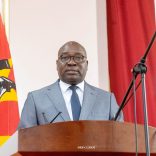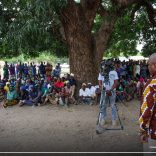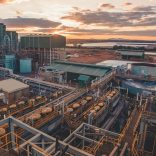Mozambique: Delay in approving Mondlane's party result of "many processes" with similar requests
Mozambique may solve current crisis by selling gas in advance – Deputy Minister of Industry and Trade

Mozambique’s Deputy Minister of Industry and Trade, Rajendra de Sousa, believes that Mozambican can solve its current debt crisis through advance sales of natural gas.
Interviewed by the Portuguese daily “Publico”, Sousa said the crisis is structural, but made worse by the public debt. This debt soared by some 20 per cent with the government guarantees granted in 2013-2014 for over two billion US dollars worth of loans contracted by three quasi-public companies – the Mozambique Tuna Company (EMATUM), and the security linked companies Proindicus and Mozambique Asset Management (MAM).
But Sousa was confident that this debt could be swiftly cleared by sales in advance of the huge gas reserves discovered in the Rovuma Basin, off the coast of the northern province of Cabo Delgado. “If we sell the gas in advance, if we do it in a year or two, the revenue will be far greater than the debt”, he argued.
The gas discoveries have been made in blocks where the operators are the Texas-based company Anadarko, and the Italian energy company ENI. But so far all the gas remains at the bottom of the sea – neither Anadarko nor ENI have yet made their final investment decision, on which will depend the billions of dollars required to build the factories making liquefied natural gas (LNG).
Sousa argued that the crisis predates the loans guaranteed by the government of President Armando Guebuza. When the raw materials exported by Mozambican began to decline in value, “the economy began to feel the effect. If you look at the exchange rate, it began to slip well before the problem of EMATUM. The fall in the international reserves began earlier”.
Sousa also noted that Mozambique’s recent high economic growth rates are based on capital intensive foreign investment which does not create many jobs. “What we have to explain to ordinary citizens is that this growth will not be felt in their pockets very soon, because it is not in a sector which provides much employment”, said the Deputy Minister. “Even when it does provide employment, since these are capital intensive industries, the billions go to machines, not to wages”.
He argued that the EMATUM, Proindicus and MAM loans should be renegotiated “to terms and conditions that our economy can support, because we are a sovereign state, we are not a failed state”. He accepted that “what the previous government did, the new goverment has to assume, but it has to assume it with a different stance”.
“The country has to honour its commitments, but we don’t have to honour the face value”, he added. “We must see the capacity we have to pay, and the time. If I go to the creditor and say ‘I can’t pay’, then either there is a renegotiation or there is a default”.
But any default would also be the responsibility of the European banks such as Credit Suisse and VTB of Russia for failing to carry out due diligence when they lent the money to EMATUM, Proindicus and MAM. Were the people at Credit Suisse illiterate, he wondered.
As one example, he noted that “they sold us boats, but we don’t have sailors. Shouldn’t the people at the bank have asked whether we had sailors? That was the least we could expect’.
Mozambique, Credit Suisse and VTN “are all in the same boat, with very small margins”, Sousa said. “We have to comply, but they also need Mozambique so they they don’t tell their shareholders that they haven’t been professional”.
As for the international audit of EMATUM, Proindicus and MAM, agreed upon in principle at last month’s meeting between President Filipe Nyusi and IMF General Director Christine Lagarde, Sousa said this must be used to strengthen Mozambique’s institutions, notably the Attorney-General’s Office.
“Let the IMF say what it wants”, he added, “but let it be done within the PGR. That’s a way of building the capacity of this institution”.
Sousa took a swipe at the theory of “the resource curse”. He did not believe that the exploitation of natural resources led inevitably to misery.
“There’s this theory that resources lead to disaster”, said Sousa, “but why didn’t that happen in Norway, in Italy, in England? Go to our neighbour, Botswana. They have diamonds,but that didn’t lead to misery”.
He was all in favour of foreign investment in the country’s resources. “I want them to take the diamonds, I want them to take the gas”, declared Sousa. “The gas is here for the next 100 years. The more we delay its exploitation, the more we are sacrificing the next generation. I don’t want my grandson to be waiting for the gas”.
The revenue from the gas, he argued, could go towards industrialisation, and towards linking the countryside to the cities, in a way that breaks with the current extractive model. “We have to do all in our power to restore rural trade”, said Sousa.
Rural trade had been devastated during the war of destabilisation when the apartheid backed Renamo rebels had destroyed large numbers of rural shops.
“The state doesn’t have any money, but it can create the best environment possible”, argued Sousa. “The shops are there, they’re just damaged. So we can ask a businessman to rehabilitate a shop, and the cost can be discounted on his taxes for two or three years”.












Leave a Reply
Be the First to Comment!
You must be logged in to post a comment.
You must be logged in to post a comment.